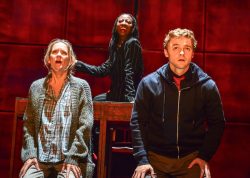 ‘WHEN an irresistible force, such as you. Meets an old immovable object like me. You can bet just as sure as you live, Something’s Gotta Give, Something’s Gotta Give’.
‘WHEN an irresistible force, such as you. Meets an old immovable object like me. You can bet just as sure as you live, Something’s Gotta Give, Something’s Gotta Give’.
So go the lyrics of the popular Johnny Mercer song. The problem is that while the words are a romantic bit of fun in the musical context, in real life they represent a basis for tragedy.
The story of Romeo and Juliet, the euphemistically-termed “troubles” in Northern Island between Protestants and Catholics, with intervention from the Nationalist Militia and IRA, racism and terrorism, all represented in the Sabrina Mahfouz adaptation of Malorie Blackman’s series of novels, bear witness to these facts.
The big twist – one that makes you sit up and take notice immediately – is that it is the Black community, the Crosses, who do, and have, held power for generations, form the bigoted entrenched establishment. It is the White population, the Noughts, who are the underdogs, barred from a decent education and job opportunities, arrested and searched for no real reason, until forced, as they see it, to turn to violence in order to gain access to a better life.
 Caught in the middle of this impossible situation are the Romeo and Juliet figures of Callum and Sephy, who, blinded by love, see no reason even in this fractured society, why both families are determined to keep them apart. James Arden and Effie Ansah, with few histrionics and a great deal of pent-up passion, develop Callum and Sephy from innocent naive teenagers to mentally-scarred young adults who at last are joined in love before being savagely torn apart . The irresistible force of change can only be brought about – Callum’s father Ryan (Daniel Copeland) and brother (Nathaniel McCloskey) believe – by violence. But violence only begets violence and Sephy’s egotistical politician father Kamal, (Daniel Norford) responds with more draconian measures.
Caught in the middle of this impossible situation are the Romeo and Juliet figures of Callum and Sephy, who, blinded by love, see no reason even in this fractured society, why both families are determined to keep them apart. James Arden and Effie Ansah, with few histrionics and a great deal of pent-up passion, develop Callum and Sephy from innocent naive teenagers to mentally-scarred young adults who at last are joined in love before being savagely torn apart . The irresistible force of change can only be brought about – Callum’s father Ryan (Daniel Copeland) and brother (Nathaniel McCloskey) believe – by violence. But violence only begets violence and Sephy’s egotistical politician father Kamal, (Daniel Norford) responds with more draconian measures.
 While the men followed the Victorian poem which says “But men must work and women must weep” and achieve nothing but more violence and death through their entrenched views, the women do indeed weep. Sephy’s mother Jasmine (Amie Buhari) seeks refuge from her loveless marriage in alcohol, while Callum’s once strong-willed mother Meggie (Emma Keele) withdraws further and further from the real world, defeated by the death of her husband and with two sons in permanent hiding for fear of the law.
While the men followed the Victorian poem which says “But men must work and women must weep” and achieve nothing but more violence and death through their entrenched views, the women do indeed weep. Sephy’s mother Jasmine (Amie Buhari) seeks refuge from her loveless marriage in alcohol, while Callum’s once strong-willed mother Meggie (Emma Keele) withdraws further and further from the real world, defeated by the death of her husband and with two sons in permanent hiding for fear of the law.
 In spite of all of these tragedies, and a forced absence of four years, during which each thought the other had cast them aside, the bond of love between Callum and Sephy proves strong enough to survive, and end the story on a positive note. The death of Callum, that the Crosses see as justice and the Noughts as murder, looked to have created an insurmountable void between the two factions. But the birth of Callum and Sephy’s baby brought fresh hope that could come from a new generation unsullied by the mistakes of the past.
In spite of all of these tragedies, and a forced absence of four years, during which each thought the other had cast them aside, the bond of love between Callum and Sephy proves strong enough to survive, and end the story on a positive note. The death of Callum, that the Crosses see as justice and the Noughts as murder, looked to have created an insurmountable void between the two factions. But the birth of Callum and Sephy’s baby brought fresh hope that could come from a new generation unsullied by the mistakes of the past.
The many young students in the audience, who gave Esther Richardson’s firmly-handled, well-staged production a long and sustained ovation, left with a great deal to think about, and hopefully, a realisation that they have a great responsibility awaiting them in a few short years. The more mature members of the audience were left to ponder if, on a much more serious note, the report on their stewardship of society might well read like the classic note on the headmaster’s end of term report, “Could do better”.
GRP
Photographs by Robert Day